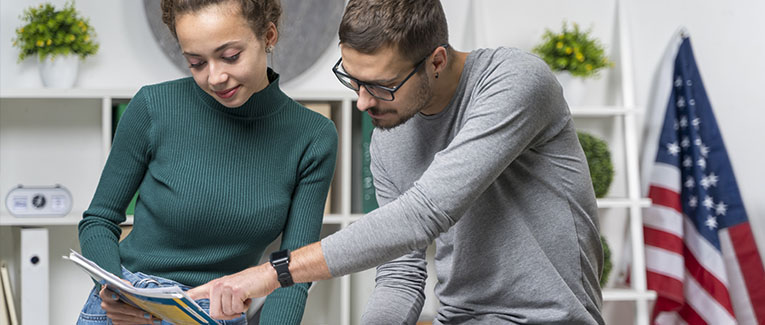
Travel
Q: Instead of getting J1 visa stamping, can I travel to the U.S. on a visa waiver program?
A: No. Even if you are a citizen of a country that participates in the visa waiver program (VWP), you must get your J-1 visa stamped to enter the U.S. as an exchange visitor. VWP cannot be used in lieu of a J-1 visa.
Q: Instead of getting J1 visa stamping, can I travel to the U.S. on a B-1/B-2 visa?
A: That really depends upon your purpose of traveling to the U.S. You can travel to the U.S. on a B1/B2 visa for short periods of study or recreational study (not vocational and also incidental to the trip.). E.g., a two-day cooking class for your enjoyment, as long as no credit is earned, is permitted.
However, any kind of study that would earn credit or certification is not permitted on a B1/B2 visa.
It is best to review the requirements of each visa type and apply accordingly.
Q: Can I enter the U.S. on a visitor visa (B2 or B1/B2 visa) and file for a change of status to a J1 visa?
A: If you would like to enter the U.S. more than 30 days in advance of the J1 program start date, you will have to obtain a visitor visa.
However, before beginning the exchange program, you will have to file Form I-539, Application for Change of Nonimmigrant Status, with USCIS with an application fee and Form DS-2019. You will be able to start your exchange program only after such a change of status application is approved. Since such applications take a long time (at least several months), you may altogether miss your entire exchange program while waiting for an approval for a change of status.
Therefore, this route is strongly discouraged.
Home Country Residence Requirement & Waiver
Q: Is there any way I can serve my two-year home-country physical presence requirement in the U.S. or a third country, other than the country of my last permanent residence, before traveling to the U.S. on a J-1 visa?
A: If you are employed by your home country’s government (in its military service or in its career foreign service) and you are serving in a different country than your home country, at the behest of your home country’s government, the period of time you spend in the U.S. or a third country after your exchange visitor program has ended may count toward fulfillment of the two-year home-country physical presence requirement.
An official of your home country government, through their embassy in Washington D.C., should provide a written statement indicating the above situation before the Waiver Review Division can determine whether you have satisfied the physical presence requirement.
Q: How can I obtain the copies of my lost DS-2019/IAP-66 forms?
A: Please contact the responsible officer or alternate responsible officer of the exchange program in which you participated while on the J-1 visa to get the copies of the lost DS-2019/IAP-66 forms.
However, the Waiver Review Division cannot proceed with your waiver recommendation application until you have provided copies of all of your DS-2019/IAP-66 forms. Therefore, it is your responsibility to keep all your DS-2019/IAP-66 forms.
Q: What should I do if I cannot get duplicate copies of my DS-2019/IAP-66 forms?
A: Submit a signed letter from your responsible program officer with information about your program and your participation in it.
Termination
Q: If my sponsor terminates my program, what will happen to my J-1 visa status?
A: If your sponsor terminates your participation in the exchange program, they will enter this information into SEVIS. You have no grace period, and you must depart the U.S. immediately.
Q: If I withdraw from my program, what will happen to my J-1 visa status?
A: If you withdraw from your program, you should notify your sponsor who will enter this information into SEVIS. You have no grace period, and you must depart the U.S. immediately.
Sponsor
Q: Do I really need a sponsor?
A: Everyone who would like to come to the U.S. on a J-1 visa needs a sponsor.
The U.S. Department of State designates U.S. government, academic, and private sector entities to conduct educational and cultural exchange programs.
Program sponsors are responsible for screening and selecting eligible foreign nationals for participation in their designated exchange visitor program, as well as supporting and monitoring exchange visitors during their stay in the U.S.
Q: Do sponsors operate only in one state?
A: The list of designated sponsors provided by the U.S. Department of State lists the official locations of the sponsors. However, many of them can place participants anywhere in the U.S., no matter where they are located.

